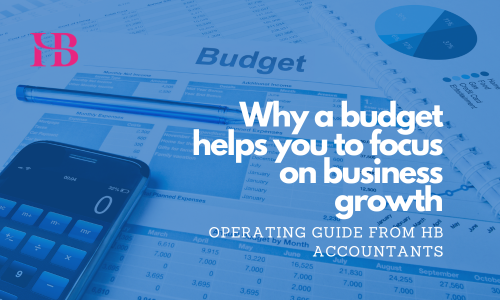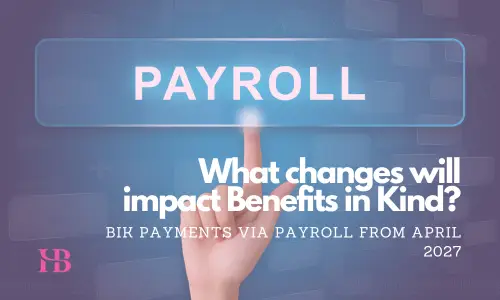Are you looking for clarity over the future direction of your business? Do you want to know the actions you should take in order to grow your business? Then consider taking time to create a budget for your business.

This blog will share the benefits of creating a budget – also known as an operating budget – and the process to follow. It will help you to allocate specific resources efficiently and effectively.
What is a business budget?
A business budget is a financial plan that is created for the year ahead based on historical data, including income and expenditure. It should be created as part of your planning process as it shows you what expenditure is likely to be needed in order for you to reach your goals.
This information helps you to make informed business decisions about whether you need to purchase new equipment, move offices, take on (or release) staff, and so on. It is also key to help you manage any debt, reduce loans, or obtain finance.
Get people involved and review your budget regularly!
Depending on the size of your business, you may need more than one budget. A budget may be needed per department, per market sector, or per office. If you are a larger or multi-faceted business, the rigour of creating a budget is a good opportunity to get all decision makers involved, rather than leaving it to the finance team. This means that the decision makers have a vested interest in the numbers they input into the budget and are more likely to buy into your future vision for the business, as well as managing spending decisions.
Once you’ve created a budget, don’t just file it away – review it regularly! This document should be keeping you on track to reach your goals and to ensure that you use your resources wisely to get there!
HB TIPS: How to create a budget
These are some key actions to take when creating your budget.
1. Prepare!
You will probably need input from various people in order to analyse the historical spending, resource requirements, turnover, and cash flow needed to allocate revenue and expenditure for the year ahead.
Be clear about who needs to be involved in this process, brief them, and set deadlines well in advance of when you need the data. This allows extra time in case of unexpected events (sickness, family emergencies, holiday plans) and gives you the opportunity to make any adjustments needed too!
2. Create a draft budget
A draft budget is for review and comment by senior leadership and/or directors. Again, this encourages buy-in to the final version but it also introduces an opportunity to be flexible. Circumstances can change quickly, and often best laid plans may need to change to accommodate them.
3. Add a stretch target
If you’re really serious about growth then create a business-as-usual budget and add stretch targets. Add in information such as your current and desired market share and consider what additional resources, expenditure and/or loans are needed to meet the growth target.
A good idea is to speak to your potential and existing customers. Why would they choose to spend with your business over a competitor’s? What would encourage them to spend more with you? This will give you useful insights when making your stretch projections.
3. Bear in mind variable costs
Remember that if you have a stretch target, then you may have increased variable costs. To clarify: Fixed costs are those that occur regularly at a constant price such as insurance and IT equipment. Variable costs will vary depending on the volume of goods, or services your business produces, such as electricity, commission payable on sales, and raw materials.
Always add in a contingency – there will always be one-off costs, such as a new website or piece of equipment – that you may need or which may be an unexpected expense.
5. Keep monitoring your progress vs your budget
Tracking your income and expenditure against any projections made to create your budget, is key to achieving growth. In particular, keep an eye on your gross profit margin: how much you are making after paying for the direct cost of doing business.
6. Talk to your accountant!
Accountants are experts in understanding budgeting, profit and loss statements, cash flow and all the information that you have included in your budget. Whilst you can monitor your budget in house, having a second pair of independent eyes can be worth its weight in gold to spot changes or discrepancies.
Choose an accountant that has the experience and knowledge to understand how business works in real life and not just on paper, as these people will add the most value to any discussion. We recommend that you talk every month but even a bi-monthly or quarterly meeting will pay dividends.
Call us today!
If you would like to learn more about business budgets or any of the financial terms mentioned in this article then call us today on 01992 444466. Our friendly team is always on hand to discuss your business situation and support with all of your accountancy needs including management accounts, audits, tax and payroll. We look forward to talking to you!
The information contained above is for general guidance purposes only. Whilst every effort has been made to ensure the contents are accurate, please note that each individual has different circumstances and it is essential that you seek appropriate professional advice before you act on any of the information contained herein. HB Accountants can accept no liability for any errors or omission or for any person acting on or refraining from acting on the information provided in the above
Read latest updates below or click here for more
- Why a budget helps you to focus on business growth
 Are you looking for clarity over the future direction of your business? Do you want to know the actions you should take in order to grow your business? Then consider taking time to create a budget for your business. This blog will share the benefits of creating … Continue reading
Are you looking for clarity over the future direction of your business? Do you want to know the actions you should take in order to grow your business? Then consider taking time to create a budget for your business. This blog will share the benefits of creating … Continue reading - How a SME Owner Can Create More Time
 SME owners and managers – are you part of the one in five small and medium-size enterprise managers that work on average an additional 3 hours a day on a regular basis? Or one of the 33% that claim that there just aren’t enough minutes in a … Continue reading
SME owners and managers – are you part of the one in five small and medium-size enterprise managers that work on average an additional 3 hours a day on a regular basis? Or one of the 33% that claim that there just aren’t enough minutes in a … Continue reading - A New Academic Year for our Student in Zambia
 As the new academic year unfolds in Zambia, we are delighted to share an update about our sponsored student, Getrude. Currently in her second year at Chalimbana University, Gertrude is studying Business Administration in Accounting and Finance. We sponsor Gertrude through the African Impact Foundation, a charity … Continue reading
As the new academic year unfolds in Zambia, we are delighted to share an update about our sponsored student, Getrude. Currently in her second year at Chalimbana University, Gertrude is studying Business Administration in Accounting and Finance. We sponsor Gertrude through the African Impact Foundation, a charity … Continue reading - Benefits in Kind via the payroll
 From April 2027, Benefits in Kind (BIK) payments will need to be paid and recorded via payroll each month. Businesses need to prepare for this change.
From April 2027, Benefits in Kind (BIK) payments will need to be paid and recorded via payroll each month. Businesses need to prepare for this change. - Getting a mortgage when you’re self employed
 Self employed and want to buy a house? It is possible to get a mortgage when you’re self-employed and most lenders are quite supportive and should offer the same rates as someone in a permanent full time job. However, as you do not have an employer to … Continue reading
Self employed and want to buy a house? It is possible to get a mortgage when you’re self-employed and most lenders are quite supportive and should offer the same rates as someone in a permanent full time job. However, as you do not have an employer to … Continue reading - HB Accountants Leads Installation of Life-Saving Defibrillator in Rye House, Hoddesdon
 A potentially life-saving public access defibrillator has been installed in the Rye House area of Hoddesdon, made possible by local business HB Accountants, in partnership with local charity, Hearts for Herts, and a generous donation from Plumpton House landlord Clive Martin. HB Accountants’ fundraising had personal inspiration … Continue reading
A potentially life-saving public access defibrillator has been installed in the Rye House area of Hoddesdon, made possible by local business HB Accountants, in partnership with local charity, Hearts for Herts, and a generous donation from Plumpton House landlord Clive Martin. HB Accountants’ fundraising had personal inspiration … Continue reading

